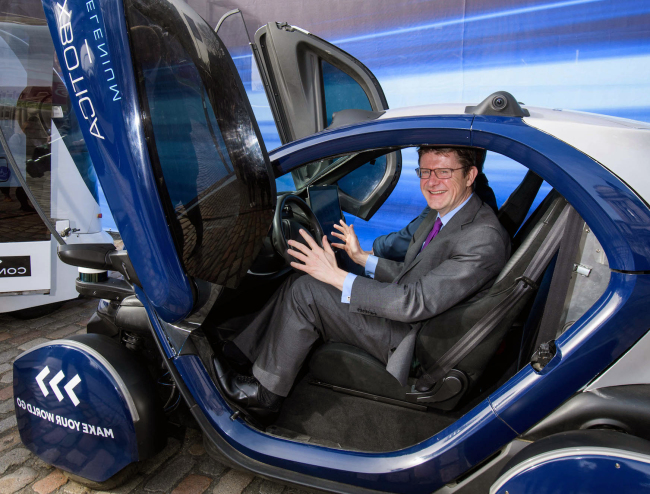The United Kingdom government launched the first phase of its multimillion-dollar investment in battery technology, paving the way for the country’s lead in designing, developing and manufacturing of electric vehicle batteries, according to the British Embassy in Seoul.
The $320 million investment, known as the Faraday Challenge, comes as the UK tries to secure a strategic position in the global renewable energy market and fight against global warming.
“The launch of the Faraday Challenge is a powerful demonstration of the UK’s commitment to innovation and our climate change obligations,” British Ambassador to Korea Charles Hay told The Korea Herald. “This initiative will be central to the development of our smart energy network and the continued strength of our automotive manufacturing industry.”
The scheme will act as an important catalyst for British innovations, jobs and business growth, he added, noting there will be “exciting opportunities” for Korean enterprises to invest in the UK.
The initiative comprises of research, innovation and scale-up, and will spur competition aimed at boosting the research and development capacities of UK battery technology, according to the diplomatic mission in Seoul.
The $320 million investment, known as the Faraday Challenge, comes as the UK tries to secure a strategic position in the global renewable energy market and fight against global warming.
“The launch of the Faraday Challenge is a powerful demonstration of the UK’s commitment to innovation and our climate change obligations,” British Ambassador to Korea Charles Hay told The Korea Herald. “This initiative will be central to the development of our smart energy network and the continued strength of our automotive manufacturing industry.”
The scheme will act as an important catalyst for British innovations, jobs and business growth, he added, noting there will be “exciting opportunities” for Korean enterprises to invest in the UK.
The initiative comprises of research, innovation and scale-up, and will spur competition aimed at boosting the research and development capacities of UK battery technology, according to the diplomatic mission in Seoul.

On July 24, British Secretary of State Greg Clark announced the start of the four-year project, which forms a key pillar of the government’s industrial strategy.
“The Faraday Challenge is a perfect example of the type of innovative collaboration between the industry and our world-leading science base that our government’s industrial strategy is committed to delivering,” Clark said. “We want to grow the UK’s reputation as a global ‘go-to’ destination for battery technology and ensure we continue to attract inward investment from across the globe.”
As part of the industrial strategy, Clark also announced plans to break down barriers preventing new technologies and business models from entering the energy market.
“One of the strengths of an industrial strategy is to be able to bring together concerted effort on areas of opportunity that have previously been in different sectors, or which require joining forces between entrepreneurs, scientists and researchers, industries, and local and national government,” he explained.
The UK government said it recognized the country’s changing energy system, with more low carbon energy being generated through renewables such as wind and solar that are located close to homes and businesses. While new technologies that help store and distribute energy are emerging, their costs are falling, it said.
Kim Ji-seok, energy innovation manager at the British Embassy in Seoul, said, “The UK government believes battery industry is an essential part of its electrification of the automobile industry, and is seeking partnerships with countries with experience and expertise such as South Korea to advance research and mass-scale production in the UK.”
The wider uptake of batteries in automobiles and smart meters is expected to create new opportunities, Kim forecast, citing home batteries that are manufactured by LG Chem in Britain and sold across Ikea stores.
Korean battery manufacturers can plow capital into Britain’s automobile sector, he advised, pointing out that brands like Mini and Jaguar will soon launch electric vehicles which will increase demand for batteries.
By Joel Lee (joel@heraldcorp.com)







![[Graphic News] More Koreans say they plan long-distance trips this year](http://res.heraldm.com/phpwas/restmb_idxmake.php?idx=644&simg=/content/image/2024/04/17/20240417050828_0.gif&u=)
![[KH Explains] Hyundai's full hybrid edge to pay off amid slow transition to pure EVs](http://res.heraldm.com/phpwas/restmb_idxmake.php?idx=644&simg=/content/image/2024/04/18/20240418050645_0.jpg&u=20240419100350)





![[From the Scene] Monks, Buddhists hail return of remains of Buddhas](http://res.heraldm.com/phpwas/restmb_idxmake.php?idx=652&simg=/content/image/2024/04/19/20240419050617_0.jpg&u=20240419175937)

![[KH Explains] Hyundai's full hybrid edge to pay off amid slow transition to pure EVs](http://res.heraldm.com/phpwas/restmb_idxmake.php?idx=652&simg=/content/image/2024/04/18/20240418050645_0.jpg&u=20240419100350)

![[Today’s K-pop] Illit drops debut single remix](http://res.heraldm.com/phpwas/restmb_idxmake.php?idx=642&simg=/content/image/2024/04/19/20240419050612_0.jpg&u=)